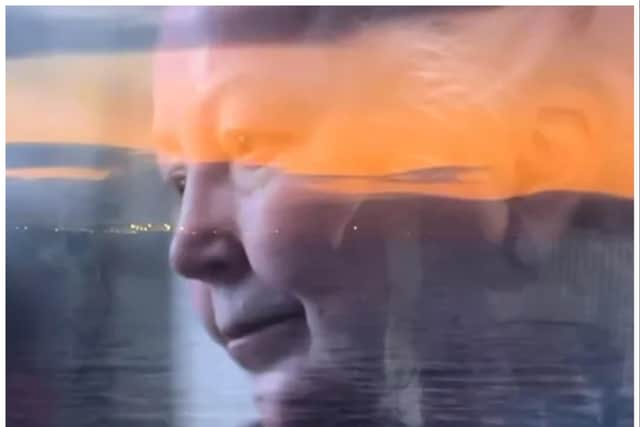Tributes as Doncaster woman who was repatriated to Ireland because mum was unmarried dies
and live on Freeview channel 276
Maria Cahill, 69, was the focus of a BBC investigation earlier this year – revealing how despite being born in London, she and her Irish mum Philomena were sent back to Ireland as part of a programme of repatriations for thousands of unmarried women and girls, from the 1930s until the 1970s.
Their journey was organised by state authorities and religious charities.
Advertisement
Hide AdAdvertisement
Hide AdCampaigners say that in many cases the repatriations, which were supposedly voluntary, were forced upon the women.


Maria had recently spoken out about her ordeal in a bid to piece together her early life, while seeking an apology from the UK authorities over the forced repatriations.
Her daughter Fiona said that Mrs Cahill died at the weekend.
She said: “My mum sadly passed on Saturday night, Sunday morning meeting her wishes of dying at home surrounded by her family.
Advertisement
Hide AdAdvertisement
Hide Ad"We held and stroked her hands and head by light from candles and fairy lights.
"Turlough O’Carolans harp music played as the fan gently moved the voile she hangs in the doorways.
"When she took her last breath, our hearts now filled with the leaking hot heat and purest light of a dying star broke wide open and poured into each other. I have never felt such love.
“All of us including her have viewed having these past three short weeks as a huge privilege. It has not been without hardship difficulties or pain but the love and beauty we shared and witnessed supersedes all. It will always be with us, and it goes beyond us. It reaches out to undo separations and shine light into the darkest of places that my beautiful mum was witness to.
“Thankyou to everyone who ho has shared in that with us.”
Advertisement
Hide AdAdvertisement
Hide AdShe has also established a funeral fund, which you can donate to HERE
Added Fiona: “It means a great deal to us to be able to give her the funeral she deserves and fulfil her wishes.”
Maria was just six weeks old when her mother Philomena was repatriated from Britain to Ireland.
Born in London and a British citizen, Maria was sent to one of Ireland's secretive mother-and-baby homes – regarded as places of punishment for sin.
Advertisement
Hide AdAdvertisement
Hide AdShe was permanently separated from her mum when she was aged only two.
Philomena was 19 when she gave birth to Maria in 1954, moving to London to work in a cigarette factory and where she met Maria’s father.
She then spent 40 years compiling documents and researching, trying to solve the mysteries of her childhood.
A baptism certificate shows Maria was christened at a church in London on 27 April 1954, a month after her birth.
Advertisement
Hide AdAdvertisement
Hide AdThe next record in the sequence is from the ledger book at Castlepollard mother-and-baby home in County Westmeath, where Philomena and Maria arrived in May 1954.
Philomena spent two years there - which, at the time, was the standard period for the so-called "moral rehabilitation" of unmarried mothers who were labelled as "first offenders".
Maria told the BBC earlier this year: "They took my mother's name away because she was a 'bad girl' - and called her Cyril."
The ledger records "Cyril" as being Philomena's "house name", which the women and girls in the institution were to be known as during their time there.
Advertisement
Hide AdAdvertisement
Hide AdPhilomena and Maria saw each other for the last time in 1956.
Maria recounted how the woman who adopted her in Ireland was emotionally abusive: "I grew up so lonely."
In later life Maria and Philomena coincidentally lived in Edinburgh at the same time, unknown to each other.
"I could have met my mum," said Maria. "I feel I was taken out of her hands - I was cheated."
Advertisement
Hide AdAdvertisement
Hide AdThe difficulties Maria faced in finding out about her past are shown by the fact she has a UK birth certificate, recording Philomena as her mother - and an Irish birth certificate, on which her adoptive parents are listed as her mother and father.
Maria only learned Philomena's identity after Philomena died.
She discovered she had half-siblings and that Philomena had been looking for her too.
However Philomena had been led to believe that Maria had been adopted in Canada.
Advertisement
Hide AdAdvertisement
Hide Ad"I was a much-loved and wanted child," Maria said, adding: "Why didn't they tell her more about me?"
During the 20th Century, the Catholic Church had huge power in Ireland and the country was more socially conservative than the UK.
Unmarried, pregnant women frequently left Ireland to avoid going into oppressive institutions, most often to Great Britain.
Fiona said there should be an official apology for what she described as an "anti-Irish, anti-single-mothers scheme".
Advertisement
Hide AdAdvertisement
Hide Ad"There'll never be a full sense of closure for my mum because she never had the reunion with her mother," said Fiona.
"But just to have the truth put out there and be told 'sorry' would mean so much."
Maria spoke about her experience in the hope she could help other survivors.
"My advice to women who are are going through this is to keep strong,” she said.
"There's always a paper trail.
"It might have taken me 40 years but eventually the bits and pieces about my life are coming together."